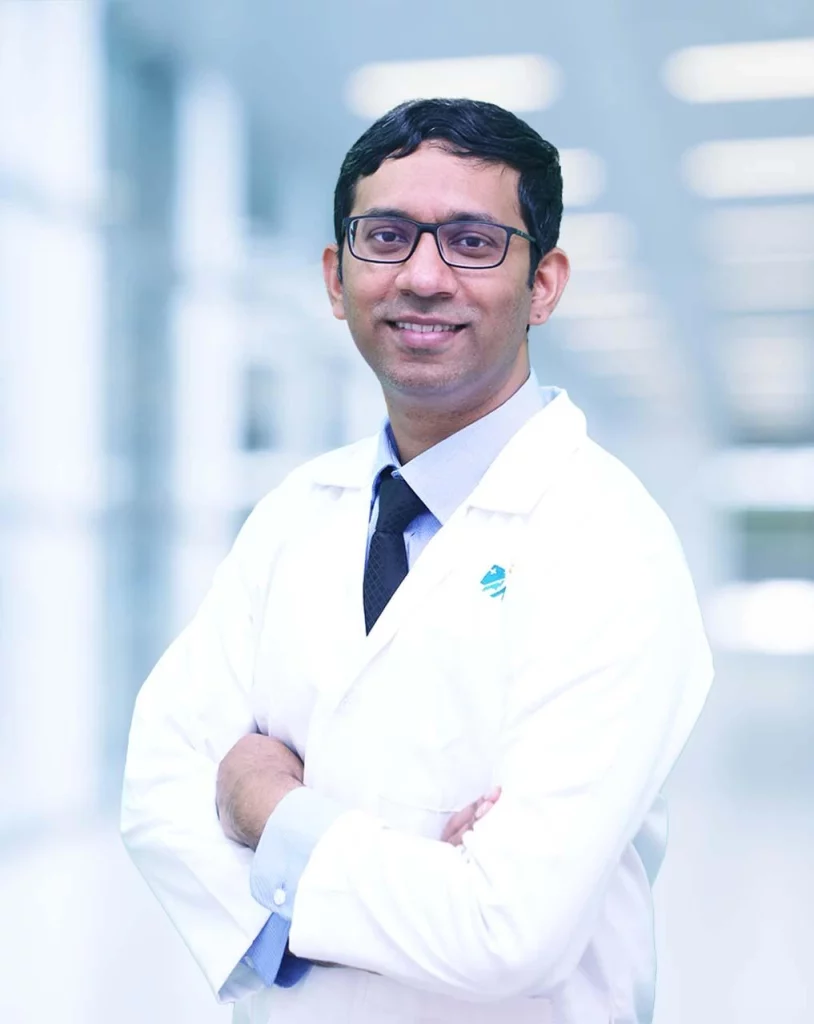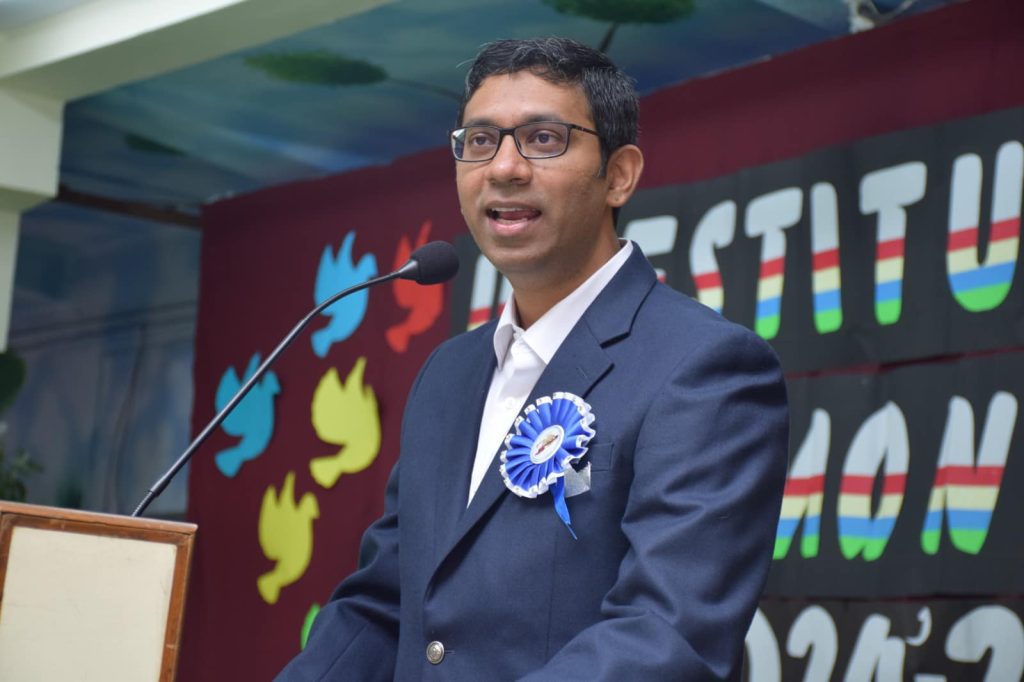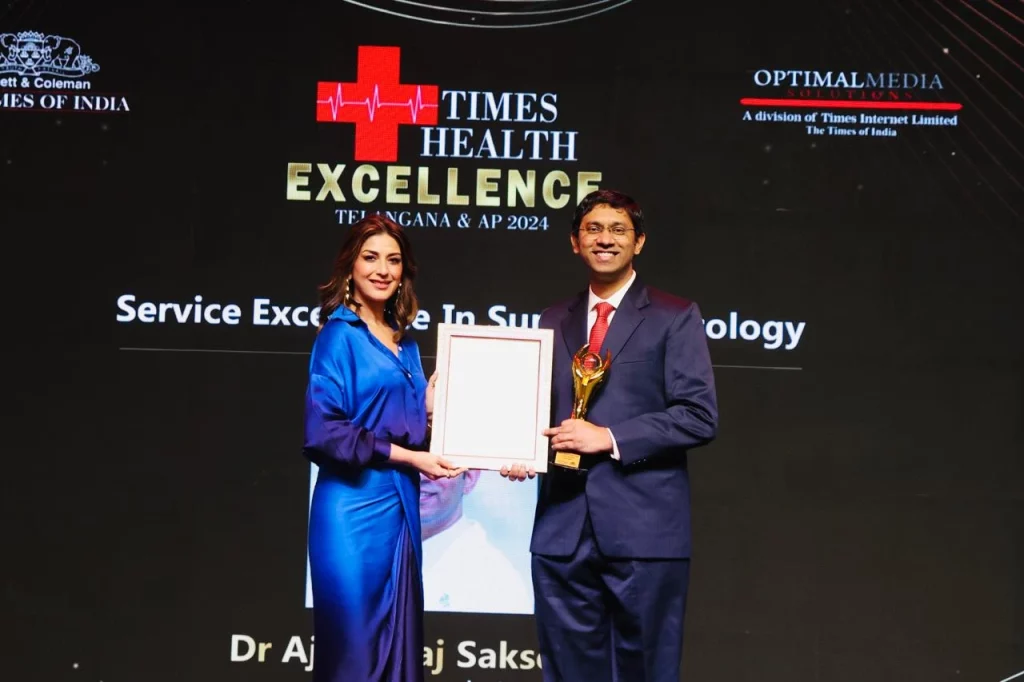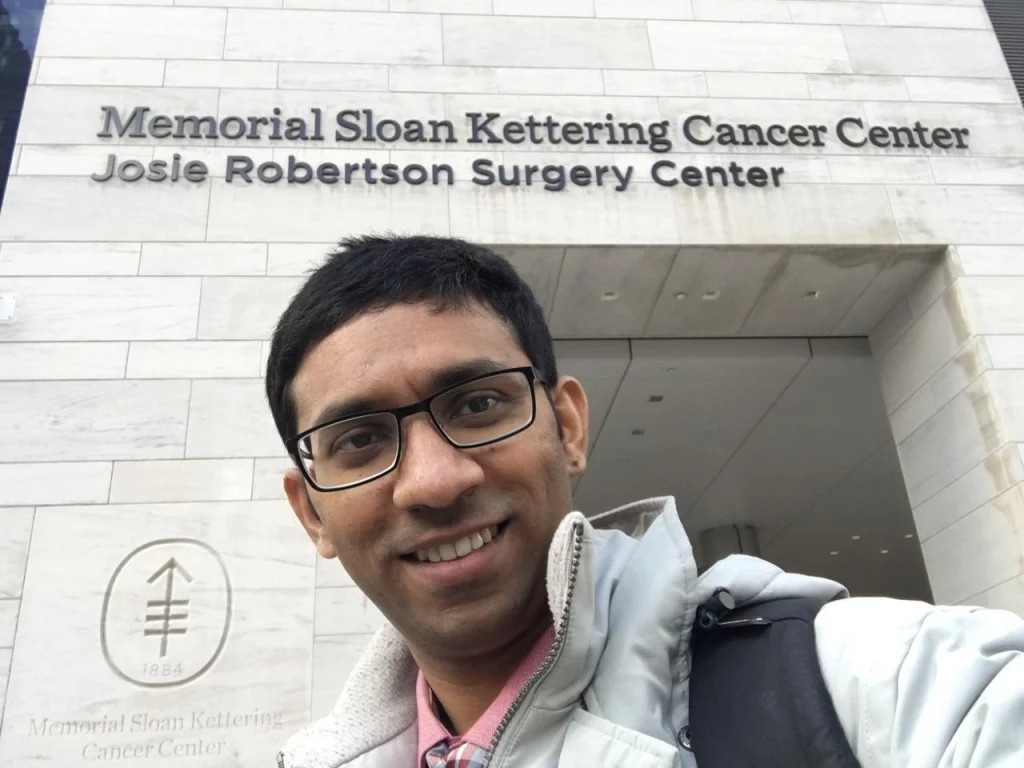(October 11, 2025) Conversations in Ajesh Raj Saksena’s home always revolved around medicine, recovery stories, and lessons from practice. His father and grandfather were renowned doctors, so the dinner table was often filled with discussions about patients, diseases, and healing.
Growing up in that environment instilled in him the passion to carry forward the family’s medical legacy. It led Dr. Ajesh Raj Saksena not only to join the medical profession but to make a difference in it. “Medicine is not just about science, but about relationships, trust, and humanity. Healing often lies as much in listening and caring as it does in medicines or procedures,” smiles Dr. Ajesh Raj Saksena, Senior Consultant — Surgical Oncology at Apollo Cancer Institute (Apollo Hospital), in a chat with Global Indian.
Despite opportunities to build a career abroad after his training in India and overseas, Dr Ajesh felt a deeper calling to stay back and work for the people of his own country. With over 12 years of clinical expertise in managing complex cancer cases especially breast, gastrointestinal, and gynecological malignancies, Dr. Ajesh is highly skilled in advanced minimally invasive surgical techniques including 3D and 4K laparoscopy, robotic surgery, fluorescence-guided surgery, cytoreductive surgery, and HIPEC.

The reality of cancer
“Cancer is no longer something that happens to someone else. It is a reality for India, for our families,” he says. Every year in India, about 1.5 million people are newly diagnosed with cancer, and nearly 850,000 lives are lost. “Statistically, one in nine Indians will face cancer during their lifetime. Worldwide, cancers like breast, lung, colorectal, and prostate dominate.”
In terms of deaths, lung cancer remains the biggest killer. “India is right in the middle of this storm. Our cancer burden is steadily rising. Not suddenly, not overnight, but in a clear, predictable upward curve,” Dr Ajesh mentions.
Patterns and causes
In women, breast cancer is the number one cancer, followed closely by cervical cancer. In men, oral, lung, and esophageal cancers dominate.
“These patterns are different from the West. Because of tobacco, both smoked and chewed, India has more than 260 million tobacco users. That one fact alone explains a huge part of our cancer burden.”
A double burden
“We are facing a double burden. On one hand, we see lifestyle-related cancers rising because of obesity, lack of exercise, unhealthy diets, alcohol, and pollution. On the other hand, we still struggle with infection-related cancers—like cervical cancer from HPV, or liver cancer from hepatitis viruses.” India, he says, is fighting both battles simultaneously.
At its core, cancer occurs when normal cells stop obeying the rules. “They grow uncontrollably. And that happens when DNA inside the cell gets damaged. That damage can come from tobacco, alcohol, pollution, poor diet, and inactivity, or infections like HPV, hepatitis B and C, or H. pylori,” explains Dr. Ajesh, adding that even sun exposure and workplace chemicals cause cancer.
View this post on Instagram
Genes and inheritance
Sometimes, cancer stems from genes people inherit. “Only about 5 to 10 percent of cancers are truly hereditary. If your mother had breast cancer, it doesn’t mean you surely will. But your risk may be higher.”
Certain mutations like BRCA1 and BRCA2 run in families. “That’s why if there’s a strong family history, early cancers, or multiple relatives affected, we recommend genetic counseling. But most cancers are not inherited; they are acquired during life.”
Prevention: The to-do list
Dr Ajesh mentions that 30 to 50 percent of cancers can be prevented. “Quit tobacco completely, limit alcohol, stay active, eat wisely—more fruits, vegetables, and fiber; less processed food and red meat. Importantly, people must get vaccinated—HPV vaccine for adolescents, Hepatitis B vaccine for everyone at risk. One must protect themselves against infections.”
He suggests annual cancer screenings for those with tobacco and alcohol habits, and once every 3–5 years after age 30 for others. “The HPV vaccine for girls and boys in adolescence is the best prevention.”
Lessons from family
Born in Hyderabad, Dr. Ajesh was the third child in his family, arriving after an 11-year gap following his two elder sisters. While his father has been a doctor, his mother is an architect. “From my mother, I learned precision and aesthetics; from my father and grandfather, compassion and healing.”
He studied at Little Flower High School, Abids, run by the Montfort Brothers of St. Gabriel. Active in sports, he played cricket, basketball, table tennis, badminton, and tennis, representing his school in inter-school basketball competitions. As part of the National Cadet Corps (NCC), he learned leadership and discipline.

Top ranker
After completing school, Dr. Ajesh joined Kakatiya Junior College and later trained at Sri Chaitanya College for the EAMCET entrance exam. “That year was defining as I secured the 12th rank statewide among nearly 40,000 applicants. This gave me the privilege of choosing any medical college I wanted,” he recalls.
Osmania Medical College: A family tradition
It was a dream to join Osmania Medical College (OMC), the same institution where his father, Dr. Suresh Raj Saksena, and grandfather, Late Dr. Raghunandan Raj Saksena, had studied. “Walking into Osmania was not just about beginning my medical education, it was about honoring a family tradition,” smiles Dr. Ajesh, who joined OMC in 2003 and completed his internship in 2009 with first-division honors.
During his student life, he met his would-be wife, Dr. Sumina Reddy, a gynecologist and infertility specialist trained in minimal access gynecologic surgery. The two often collaborate professionally, operating together on complex surgical cases.
Staying back
During this time, he had the option to prepare for the USMLE and pursue a career abroad. However, after much thought, he chose to stay in India. “For both of us, the call to serve our own people and be present for our families was stronger than the lure of opportunities overseas,” says Dr. Ajesh, who then pursued post-graduation in General Surgery at OMC.

Dr Ajesh Raj Saksena was honoured with the Times Health Excellence Awards for Telangana & Andhra Pradesh 2024
Training and mentorship
He trained under Prof. Dr. R. Pratap Reddy, a towering figure in surgery, who became a guiding light and father figure. “His teachings shaped my approach to surgery not just as a science, but as an art grounded in discipline, compassion, and precision.”
During this phase, Dr. Ajesh was exposed to complex, life-changing procedures like gastric or colonic pull-ups for corrosive injuries of the esophagus, Whipple’s procedure for pancreatic cancers, and complex liver resections for primary and metastatic tumors. “It was here that I began to understand the sheer complexity and depth of gastrointestinal surgery like the anatomical challenges, the delicate reconstructions, and the immense impact these operations had on patients’ survival and quality of life.”
Building a career
Determined to specialize further, he secured an All-India Rank of 54 in the National Board of Examinations for Superspeciality. This led him to Omega Hospitals as the first postgraduate trainee in Surgical Oncology, completing his training in December 2016.
He later served as a Senior Resident at MNJ Regional Institute of Oncology from February 2017 to February 2018, and then joined Basavatarakam Indo-American Cancer Hospital & Research Institute, where he trained under Dr. T. Subramanyeshwar Rao, Medical Director. “It was here that I mastered advanced techniques in minimal access surgery and imbibed the philosophy of delivering high-quality care with deep empathy.” In October 2022, he moved to Apollo Cancer Institute, Jubilee Hills, Hyderabad, where he established his own cancer surgical unit.
Observership in New York
As part of his oncology journey, Dr. Ajesh did his observership at Memorial Sloan Kettering Cancer Center, New York, working with Prof. Jatin Shah, a legendary figure in Head and Neck Oncology.
“The experience was transformative. Observing how healthcare was delivered with meticulous planning, structured protocols, teamwork, and cutting-edge facilities was an eye-opening lesson.” It gave him a fresh perspective on what it means to deliver not just treatment, but comprehensive cancer care.

Academic foray in Paris
Alongside clinical training, he began contributing academically early. His first paper was presented at the International Hepato-Pancreato-Biliary Association (IHPBA) Congress in Paris (2012), where he spoke on surgical resections of giant hepatic hemangiomas which are rare and complex liver lesions.
“This opportunity deepened my interest in hepatobiliary and gastrointestinal surgery and reinforced the importance of research, collaboration, and knowledge sharing.”
A surgeon’s routine
As a surgical oncologist, Dr. Ajesh’s profession demands long hours and high focus. To maintain balance, he follows a disciplined daily routine—waking at 5:00 AM, meditating for 30 minutes, and working out. “I carry my own lunchbox—simple, home-cooked meals like rice, curry, curd, fruit, and healthy snacks—and consciously avoid outside food.”
Rising trends and challenges
While lack of awareness about cancer symptoms is a major challenge, a worrying trend is the rise in cancer among younger patients, especially breast, stomach, and colorectal cancers. “These cancers behave more aggressively in the young. Many are in the prime of life, with small children or fertility aspirations,” says Dr. Ajesh, who urges people to invest in health insurance early before age 60 or 65, when premiums are manageable.
Stories of hope
One of his most memorable patients came from Iraq with advanced peritoneal carcinomatosis. “We took him up for a 14-hour surgery, one of the longest I’ve done. The responsibility was immense, not just technically but emotionally.” Six months later, the patient continues to enjoy a good quality of life.
Another unforgettable case was his eldest patient, a 94-year-old man with metastatic neuroendocrine carcinoma of the colon. “Despite his age, we decided on laparoscopic surgery which is a keyhole approach with minimal incision. He recovered painlessly.” He has also faced deeply personal moments operating on his schoolteacher, another teacher’s son, a husband and wife at different times, and even his mother’s best friend at 79 for advanced ovarian cancer.
View this post on Instagram
Strengthening cancer care
India has made rapid strides in cancer care from expertise to technology but more needs to be done. “The need of the hour is better cancer registries and making cancer a notifiable disease,” says Dr. Ajesh, recipient of the Young Scholar Award, HMTV Healthcare Award (2023), and Times Health Excellence Award (2024).
He also stresses on fighting food adulteration, ensuring clean air and water, and enforcing robust screening programs for early detection.
Vision for the future
Dr. Ajesh’s vision is to expand his team and specialized cancer services to make care more accessible and equitable. “I want to strengthen minimal access cancer surgery, ensuring precision with smaller incisions, faster recovery, and better quality of life,” he says. Through his YouTube channel LetsFightCancerTogether and Instagram handle @drajeshrajs, he shares simplified, evidence-based information on early signs, prevention, and treatment advances.
The Deccan Foundation
Dr. Ajesh is part of the Deccan Foundation, his father’s dream project, established to keep alive his grandfather’s legacy of medicine as a noble profession rooted in service and compassion. He is also actively involved in the Sarvodaya Grama Seva Foundation, which, along with his Osmania classmates, has set up over 20 libraries in rural government schools through private and government collaboration.
ALSO READ: Dr Tony Dhillon: The British-Indian doctor leading the pioneering trial of bowel cancer vaccine



